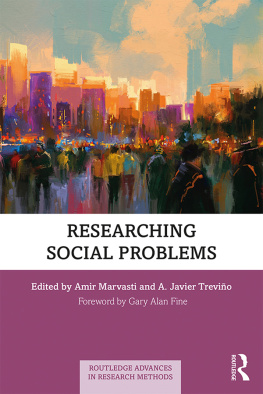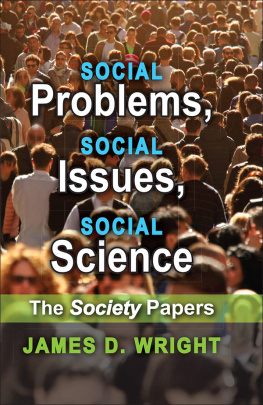SOCIAL PROBLEMS AND INEQUALITY
Shattering the old disciplinary limits with an unabashedly progressive approach John Alessio bares the underlying interconnections shaping the issues that confront us all, from everyday troubles to global disasters. His crisp, provocative analysis points the reader to examine their own role in social issues and most importantly how we can move from being part of the problem to becoming part of the solution.
R.A. Dello Buono, Manhattan College, USA
A masterful introduction to the sociological perspective that turns the illuminating power of the discipline onto important contemporary issues including the oppression of animals. This powerful political-economic analysis is a compelling argument for rejecting an unsustainable system and working for justice for all the residents of the planet.
David Nibert, Wittenberg University, USA
Solving Social Problems
Series Editor:
Bonnie Berry, Director of the Social Problems Research Group, USA
Solving Social Problems provides a forum for the description and measurement of social problems, with a keen focus on the concrete remedies proposed for their solution. The series takes an international perspective, exploring social problems in various parts of the world, with the central concern being always their possible remedy. As such, work is welcomed on subjects as diverse as environmental damage, terrorism, economic disparities and economic devastation, poverty, inequalities, domestic assaults and sexual abuse, health care, natural disasters, labour inequality, animal abuse, crime, and mental illness and its treatment. In addition to recommending solutions to social problems, the books in this series are theoretically sophisticated, exploring previous discussions of the issues in question, examining other attempts to resolve them, and adopting and discussing methodologies that are commonly used to measure social problems. Proposed solutions may be framed as changes in policy, practice, or more broadly, social change and social movement. Solutions may be reflective of ideology, but are always pragmatic and detailed, explaining the means by which the suggested solutions might be achieved.
Social Problems and Inequality
Social Responsibility through Progressive Sociology
JOHN C. ALESSIO
Minnesota State University, Mankato, USA
First published 2011 by Ashgate Publishing
Published 2016 by Routledge
2 Park Square, Milton Park, Abingdon, Oxon OX14 4RN
711 Third Avenue, New York, NY 10017, USA
Routledge is an imprint of the Taylor & Francis Group, an informa business
Copyright John C. Alessio 2011
John C. Alessio name has asserted his right under the Copyright, Designs and Patents Act, 1988, to be identified as the author of this work.
All rights reserved. No part of this book may be reprinted or reproduced or utilised in any form or by any electronic, mechanical, or other means, now known or hereafter invented, including photocopying and recording, or in any information storage or retrieval system, without permission in writing from the publishers.
Notices:
Product or corporate names may be trademarks or registered trademarks, and are used only for identification and explanation without intent to infringe.
British Library Cataloguing in Publication Data
Alessio, John C.
Social problems and inequality : social responsibility through progressive sociology. (Solving social problems) 1. Social problems. 2. Applied sociology. 3. Social conflict. 4. Responsibility. 5. Alienation (Social psychology) 6. Social action.
I. Title II. Series
361.1-dc22
Library of Congress Cataloging-in-Publication Data
Alessio, John C.
Social problems and inequality : social responsibility through progressive sociology / by John C. Alessio.
p. cm. (Solving social problems)
Includes bibliographical references and index.
ISBN 978-1-4094-1987-7 (hardback)
1. Social problems. 2. Equality. 3. Sociology. I. Title.
HN17.5A445 2011
305dc22
2011012347
ISBN 9781409419877 (hbk)
Contents
List of Figures
Foreword
When I was a beginning instructor in large-lecture courses on the sociology of social problems, I often lamented, with like-minded colleagues, about the paucity of good textbooks available for use in the course. Our main complaint was that most current books placed heavy emphasis on individual pathologies like alcoholism, crime, or mental illness, and while many of these chapters were excellent treatments of the subject, they gave much less attention to the institutional structures that contributed to or created these problems. So I solved the problem by joining with a colleague to develop our own social problems book. We focused on three interdependent and reinforcing changes in American society that we considered to be revolutionary: technological militarism, labor-displacing cybernetics, and the human rights revolution that was an oppositional voice that would no longer accept war, corporate domination, and poverty as normal features of a healthy society.
I suspect that John Alessio also found many existing social problems textbooks to be wanting, and instead of lamenting, he acted and wrote his own book. Social Problems and Inequality confronts established taken-for-granted institutions and presents a critical sociology perspective that breaks the mold of social problems books in several important ways. First, and foremost, he has focused on the interconnections among social problems rather than treating them as separate entities. Many of the conditions discussed in the book are interrelated and the result of a common set of institutional factors. Second, he uses contemporary theoretical perspectives to analyze the institutional basis of social problems, and to consider different solutions to remedy systemic problems. Using this approach provides students with a working understanding of a number of theoretical perspectives including conflict theory, structural functionalism, social exchange theory, and feminist theory. Third, the discussion of social problems keeps the spotlight on dominant institutions and corporations that are the source of social and economic inequality and responsible for their continued maintenance. Fourth, the book presents for analysis real public organizations (CIA, Enron) and highprofile historical events (Iraq War, 2008 financial crisis), thereby encouraging readers to apply the sociological way of looking at the world to their own lives and to public events.
John Alessio is passionate about his subject and he consistently challenges the reader to consider important applications of the sociological perspective to the task of positive social change. There are many memorable sections and passages in this book, but here is one that stayed with me:
What this chapter tells us is that the people of the United States and the world in general need to democratically create and control their own economy and their own media and airwaves or they will continue to let the media, and hence, the economy, control them.
Robert Perrucci
Purdue University
Preface
Solving social problems has been the goal of Sociology since its inception in the mid-nineteenth century. Much has been investigated, analyzed, and written about Sociology and its various subfields since that time. Sociologists and other social scientists have contributed a great deal toward an improved understanding of how the social world works. Many social organizations have been assisted in their efforts to achieve their goals. While sociologists have done a good job of writing about social problems as isolated individual entities, we have not done a good job of analyzing and writing about their interrelationships and common sources. Consequently, we have not been able to effectively offer credible and practical guidelines for resolving the worlds most serious social problems.








